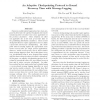Free Online Productivity Tools
i2Speak
i2Symbol
i2OCR
iTex2Img
iWeb2Print
iWeb2Shot
i2Type
iPdf2Split
iPdf2Merge
i2Bopomofo
i2Arabic
i2Style
i2Image
i2PDF
iLatex2Rtf
Sci2ools
112
click to vote
SRDS
1999
IEEE
1999
IEEE
An Adaptive Checkpointing Protocol to Bound Recovery Time with Message Logging
Numerous mathematical approaches have been proposed to determine the optimal checkpoint interval for minimizing total execution time of an application in the presence of failures. These solutions are often not applicable due to the lack of accurate data on the probability distribution of failures. Most current checkpoint libraries require application users to de ne a xed time interval for checkpointing. The checkpoint interval usually implies the approximate maximum recovery time for single process applications. However, actual recovery time can be much smaller when message logging is used. Due to this faster recovery, checkpointing may be more frequent than needed and thus unnecessary execution overhead is introduced. In this paper, an adaptive checkpointing protocol is developed to accurately enforce the user-de ned recovery time and to reduce excessive checkpoints. An adaptive protocol has been implemented and evaluated using a receiver-based message logging algorithm on wired and ...
Related Content
| Added | 04 Aug 2010 |
| Updated | 04 Aug 2010 |
| Type | Conference |
| Year | 1999 |
| Where | SRDS |
| Authors | Kuo-Feng Ssu, Bin Yao, W. Kent Fuchs |
Comments (0)

